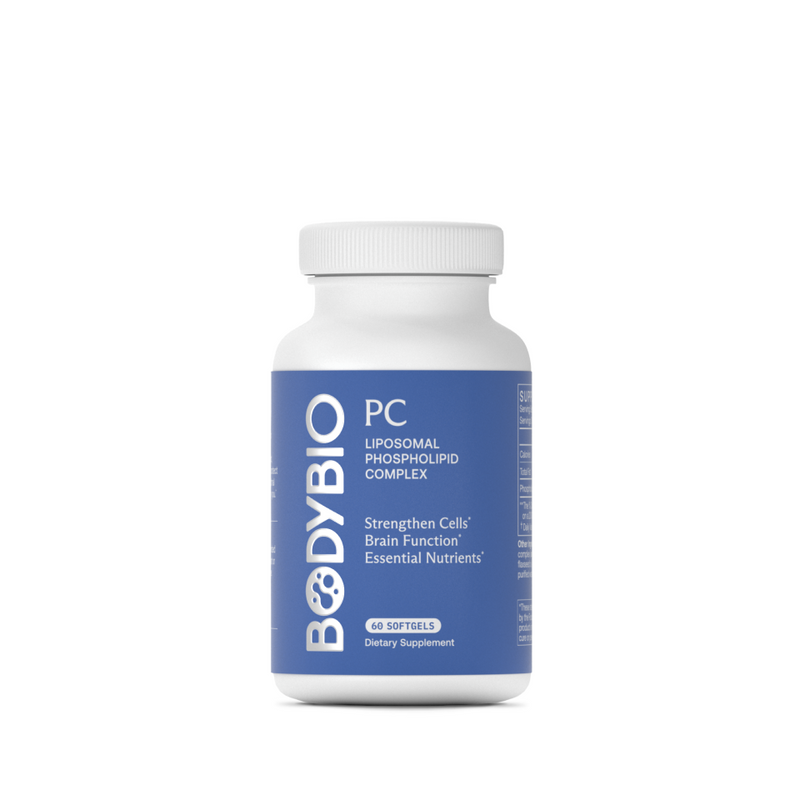Is the Brain a Muscle? (How to Use It to Stay Sharp)
Authors:

Ashley Palmer
Nutritional Therapy Practitioner, Health & Wellness Expert
Key Takeaways:
Key Points:
- The brain is responsible for everything from critical thinking to basic bodily functions — the brain also shares intriguing similarities with muscles.
- Neuroplasticity allows the brain to form and strengthen neural pathways in response to learning, problem-solving, and new experiences.
- Despite fundamental differences, both the brain and muscles thrive on the cycle of consistent use, recovery, and growth through stimulation.
The human brain is remarkable — responsible for everything from critical thinking and memory retention to controlling the body’s basic functions. Yet, despite its vital role, we still have lingering questions about its nature. One of the most common questions being: “Is the brain a muscle?” While the short answer is no, the brain is not a muscle in a literal sense, it shares some fascinating similarities with muscles in how it responds to challenges, growth, and care. Understanding this, and training your brain accordingly, can help you keep your mind sharp and healthy.
Table of Contents:
-
Understanding The Brain
-
Is Your Brain Really a Muscle?
-
Effective Strategies to Keep Your Brain Sharp
-
Nutrition and Brain Health
-
The Importance of Sleep for Brain Function
- Your Brain Is the Ultimate Muscle for Mental Sharpness
Understanding The Brain
To get to the heart of the question, “is the brain a muscle?” let’s first look at what the brain is made of. The brain consists of approximately 86 billion neurons, which are specialized cells that transmit information via electrical and chemical signals. These neurons are supported by glial cells, which provide structural and chemical support, nutrients, and protection.
Muscles are made up of fibers designed for contraction and movement — making them very structurally and functionally different from the brain. However, the brain shares some fascinating similarities with muscle tissue in how it adapts to use, training, and recovery. Just as muscles grow stronger and more efficient through exercise, the brain can build and strengthen neural connections through mental stimulation — a phenomenon known as neuroplasticity.
Both the brain and muscles benefit from periods of rest and recovery, which allow them to repair, recharge, and prepare. This dynamic ability to adapt and improve is what makes the brain such a powerful and resilient organ, capable of continuous growth throughout life.
The Brain's Structure and Function
The brain consists of billions of specialized cells called neurons that communicate through electrical and chemical signals. These neurons form a network that controls everything from sensory processing to memory and decision-making.
The brain is divided into a few key areas:
- The cerebrum, responsible for higher-order functions like thinking, memory, and voluntary movement.
- The cerebellum, which coordinates movement and balance.
- The brainstem, managing basic survival functions like heartbeat and breathing.
Together, these areas work together to manage both conscious and subconscious thinking.
Neuroplasticity: The Brain's Ability to Change
One of the brain’s most remarkable traits is its ability to adapt and reorganize itself — a phenomenon called neuroplasticity. Unlike muscles that grow larger through physical changes, the brain strengthens by forming new neural pathways. When you learn a new skill, tackle a complex problem, or engage in different experiences, your brain adapts by creating stronger, more efficient connections.
Neuroplasticity is why challenges, like learning a new language or solving puzzles, feel difficult at first but become easier over time. The more you engage your brain, the less likely you are to experience cognitive difficulties, and the more adaptable and resilient your brain becomes.
Is Your Brain Really a Muscle?
The short answer is no. But the question of whether the brain is a muscle actually stems from the brain's ability to strengthen with use (or deteriorate with disuse). While the brain and muscles differ fundamentally, they share intriguing parallels in how they grow and respond to challenges.
Muscle vs. Brain: Key Differences
Muscles are made of fibers that contract and generate movement, while the brain is composed of neurons and cells that transmit and process information. Muscles grow larger and stronger through physical activity, whereas the brain grows more connected and efficient through mental stimulation and learning. The muscles and brain also need different nutrients to physically repair and rebuild.
Similarities in Training and Growth
Despite their differences, both the brain and muscles thrive on the principle of "use it or lose it." For instance, when you learned Spanish in high school and then abruptly stopped practicing, your brain forgot nearly 90% of what you learned. You’re left with a word here, a phrase there, and overall, a jumble of incoherent translations.
Just like physical exercise builds muscle strength, mental exercise enhances brain function. Activities like solving puzzles, learning new skills, and engaging in creative pursuits can strengthen neural pathways, much like lifting weights strengthens muscle fibers.
Rest is equally important. Both muscles and the brain repair and recover during downtime, highlighting the value of restorative practices like sleep and relaxation.
Effective Strategies to Keep Your Brain Sharp
If the brain isn’t a muscle, but it acts like one in certain ways, how do you “train” it? Improving brain function and health is a lifelong endeavor, and the good news is there are plenty of ways to keep your mind sharp and resilient.
Physical Exercise and Brain Health
Exercise isn’t just for your body — it’s great for your brain too! Physical activity increases blood flow to the brain, delivering oxygen and nutrients that support neuron health. Aerobic exercise promotes the release of brain-derived neurotrophic factor (BDNF), a protein that encourages the growth of new neural connections.
How to incorporate physical exercise into your brain training:
- Aim for at least 150 minutes of moderate exercise per week.
- Combine aerobic activities like running or swimming with exercises requiring coordination, such as yoga or dance.
Mental Stimulation and Cognitive Activities
Engaging in intellectually stimulating activities helps keep your brain flexible and sharp — while also helping prevent popcorn brain. Hobbies like playing an instrument, solving puzzles, or learning a new language push your brain to form new pathways, which are essential for mental agility.
Ideas for mental stimulation to add to your brain workout:
- Take up a hobby like painting, drawing, or woodworking.
- Complete daily crosswords or Sudoku puzzles. You can also play word games like Scrabble.
- Enroll in a course to explore a new topic or skill.
- Revisit that language you once studied and relearn it.
Nutrition and Brain Health
The brain needs specific nutrients to thrive, just like your muscles need protein and amino acids to grow and strengthen. A diet rich in omega-3 fatty acids, antioxidants, and vitamins can protect against cognitive decline and promote mental sharpness.
The best foods for brain health to include in your diet:
- Fatty fish, like salmon, mackerel, and sardines, for omega-3s.
- Leafy greens, such as spinach, for antioxidants.
- Berries, particularly blueberries, for flavonoids that improve memory.
- Nuts and seeds for vitamin E, which support cognitive health.
Supplements to consider for brain health:
- Omega-3 fish oil: Supports brain health and may improve memory and focus.
- Vitamin D: Important for brain function and linked to lower risks of cognitive decline.
- B vitamins (like B6, B12, and folate): Help maintain healthy brain cells and support memory.
- Ginkgo biloba: A plant extract believed to enhance blood flow to the brain, potentially improving cognitive performance.
- Nootropics: Cognitive enhancers that may improve focus, memory, and mental clarity, including compounds like phosphatidylcholine (PC) — a key building block of cell membranes that supports brain function.
Think of it like this: you include protein in your diet because protein contains the building blocks necessary for muscle growth — similarly, PC is made up of the building blocks your brain needs to repair itself! PC is also an excellent dietary addition for those suffering from brain fog.
Alongside food and supplements, hydration is also just as important. Dehydration can impair focus, memory, and decision-making, so make sure you drink plenty of water throughout the day.
The Importance of Sleep for Brain Function
Just like sleep is essential for muscle growth and repair, sleep is also essential for a healthy brain. During sleep, deep sleep to be exact, the brain consolidates memories, clears out toxins, processes emotions, and resets itself for the next day. Chronic sleep deprivation, on the other hand, can impair cognitive function, memory, and even increase the risk of neurodegenerative diseases like Alzheimer’s.
Tips for better sleep and brain health:
- Establish a consistent bedtime routine to signal to your brain it’s time to wind down (This counts as neuroplasticity!)
- Avoid screens and caffeine in the evening to promote natural melatonin production.
- Create a comfortable sleep environment that’s cool, quiet, and dark.
Your Brain Is the Ultimate Muscle for Mental Sharpness
While the brain isn’t technically a muscle, it thrives on the same principles: use, care, and recovery. Just as muscles grow stronger with exercise and proper recovery, your brain becomes sharper and more adaptable with mental stimulation, physical activity, balanced nutrition, and quality sleep.
Your brain is the foundation of who you are and how your body functions — investing in its health is the best way to keep your brain healthy and protect your future. Treat your brain as the incredible, adaptable organ it is. Every small effort you put in strengthens your mind and builds resilience for any challenges you may encounter ahead.
Brain Anatomy and How the Brain Works. (2021). | Johns Hopkins Medicine. Brain Anatomy and How the Brain Works. Retrieved from https://www.hopkinsmedicine.org/health/conditions-and-diseases/anatomy-of-the-brain
Dang-Vu, T. T., Desseilles, M., Peigneux, P., & Maquet, P. (2006). A role for sleep in brain plasticity. Pediatric rehabilitation , 9 (2), 98–118. https://doi.org/10.1080/13638490500138702
Gómez-Pinilla, F. (2008). Brain foods: The effects of nutrients on brain function. Nature Reviews. Neuroscience, 9(7), 568–578. https://doi.org/10.1038/nrn2421
Heller, H. C., Ruby, N. F., Rolls, A., Makam, M., & Colas, D. (2014). Adaptive and pathological inhibition of neuroplasticity associated with circadian rhythms and sleep. Behavioral neuroscience , 128 (3), 273–282. https://doi.org/10.1037/a0036689
Jessen K. R. (2004). Glial cells. The international journal of biochemistry & cell biology , 36 (10), 1861–1867. https://doi.org/10.1016/j.biocel.2004.02.023
Kilgour, A. H., Todd, O. M., & Starr, J. M. (2014). A systematic review of the evidence that brain structure is related to muscle structure and their relationship to brain and muscle function in humans over the lifecourse. BMC geriatrics , 14 , 85. https://doi.org/10.1186/1471-2318-14-85
Kukla-Bartoszek, M., & Głombik, K. (2024). Train and Reprogram Your Brain: Effects of Physical Exercise at Different Stages of Life on Brain Functions Saved in Epigenetic Modifications. International journal of molecular sciences , 25 (22), 12043. https://doi.org/10.3390/ijms252212043
Lima Giacobbo, B., Doorduin, J., Klein, H. C., Dierckx, R. A. J. O., Bromberg, E., & de Vries, E. F. J. (2019). Brain-Derived Neurotrophic Factor in Brain Disorders: Focus on Neuroinflammation. Molecular neurobiology , 56 (5), 3295–3312. https://doi.org/10.1007/s12035-018-1283-6
Marzola, P., Melzer, T., Pavesi, E., Gil-Mohapel, J., & Brocardo, P. S. (2023). Exploring the Role of Neuroplasticity in Development, Aging, and Neurodegeneration. Brain sciences , 13 (12), 1610. https://doi.org/10.3390/brainsci13121610
McCallum, K. (2021). Is your brain a muscle? Retrieved from https://www.houstonmethodist.org/blog/articles/2021/may/is-your-brain-a-muscle/
Puderbaugh M, Emmady PD. Neuroplasticity. [Updated 2023 May 1]. In: StatPearls [Internet]. Treasure Island (FL): StatPearls Publishing; 2024 Jan-. Available from: https://www.ncbi.nlm.nih.gov/books/NBK557811/
Richards, S. (2024, February 29). Glial cells are more than our brain's 'glue' | Fred Hutch Cancer Center. Glial cells are more than our brain's 'glue.' https://www.fredhutch.org/en/news/center-news/2024/02/glia-neuron-communication-microdomains.html

